I am excited to share with you the latest info on service dog rules and regulations. As of 2024, the Department of Justice has implemented updated guidelines governing service animals under the Americans with Disabilities Act (ADA).
The ADA regulations, which cover both state and local government services (title II) and public accommodations (title III), define service animals as dogs that are individually trained to perform tasks or work for individuals with disabilities. These tasks can range from guiding individuals who are blind to alerting individuals who are deaf, among many others. It is important to note that only dogs are recognized as service animals under the ADA, and emotional support animals do not qualify.
Key Takeaways:
- The ADA regulations implemented in 2024 establish the rules for service dogs in state and local government services and public accommodations.
- Service animals are defined as dogs that are individually trained to perform tasks for individuals with disabilities.
- Service dogs are not required to be certified or registered under the ADA, and there is no specific training program or process.
- Service animals must be permitted in all areas where the general public is allowed, and handlers have the responsibility to control and maintain their dogs.
- It is crucial to practice proper service dog etiquette and respect the rights of individuals with disabilities and their service dogs.
Service Animal Definition and Eligibility
Under the ADA, service animals are defined as dogs that are individually trained to work or perform tasks for individuals with disabilities. These tasks must be directly related to the person’s disability.
The ADA does not require service animals to be certified or registered, and there is no specific training program or process for service dogs. Additionally, the ADA does not restrict service animals to certain breeds or sizes. As long as a dog is trained to perform tasks for a person with a disability, it can be considered a service animal under the ADA.
Service dogs undergo specialized training to assist individuals with disabilities in their daily lives. Whether it’s guiding individuals who are visually impaired or alerting individuals who are deaf, service dogs provide invaluable support and independence to those in need.
Service Dog Certification Process
- Service dogs do not require certification under the ADA.
- There is no official documentation or identification for service dogs.
- Businesses cannot ask for certification or registration of service dogs.
- The focus is on the dog’s training and ability to perform tasks or work for individuals with disabilities.
By recognizing the unique capabilities of service dogs, the ADA ensures that individuals with disabilities have equal access and opportunities in society.
Service Dog Access Rights
As individuals with disabilities, we rely on our service dogs to provide us with the necessary assistance and support to navigate daily life. Understanding the access rights granted to service dogs is crucial in ensuring equal opportunities and inclusion for people with disabilities. Under the ADA, title II and III entities are required to permit service animals to accompany us in all public places where the general public is allowed.
Whether it’s a visit to the hospital or a trip to the local grocery store, service dogs are welcome companions in these spaces. Their presence not only provides us with the necessary assistance but also contributes to our overall well-being and independence.
Service animals must be under our control at all times, as it enables us to effectively navigate public spaces. Depending on the situation, service dogs can be harnessed, leashed, or tethered, as long as it does not hinder their ability to perform their tasks. This ensures the safety and well-being of both the service dog and the individuals they assist.
It is our responsibility as service dog handlers to maintain control of our dogs through voice, signal, or other effective means. This demonstrates our commitment to the proper handling and management of our service dogs, fostering a positive and safe environment for everyone.
In situations where it may not be obvious what service our dog provides, limited inquiries can be made regarding our dog’s work or tasks. This allows others to better understand the support our service dogs offer and promotes a more inclusive environment for individuals with disabilities.
Service Dog Handler Responsibilities:
- Ensure service dog is under control at all times.
- Use appropriate techniques to guide and direct the service dog.
- Respond to commands and cues in a timely manner.
- Provide necessary care and support for the service dog’s well-being.
By recognizing and respecting the access rights of service dogs, we can create a more inclusive society where individuals with disabilities can fully participate and contribute. Let’s continue to advocate for equal opportunities and embrace the valuable role that service dogs play in our lives.
Service Dog Etiquette
When encountering individuals with service dogs, it is important to understand and follow proper service dog etiquette. Respecting the rights and needs of service dog handlers creates an inclusive and supportive environment. Here are some essential guidelines to keep in mind:
- Do not pet or interact with a service dog without permission from the handler: Service dogs are working animals and should not be distracted while performing their tasks. Always ask the handler before approaching or petting the dog.
- Avoid asking personal questions about the handler’s disability: Respect the privacy of service dog handlers and refrain from inquiring about their disabilities. Focus on interacting with the handler rather than the dog.
- Do not feed or offer treats to a service dog: Service dogs follow strict training and diet regulations. Feeding them or offering treats can disrupt their routine and impact their ability to perform their tasks.
- Keep a safe distance from the service dog: Allow the service dog to perform its duties without interference. Avoid distracting the dog through noise, sudden movements, or attempts to gain its attention.
“Remember, service dogs are not pets but highly trained working animals. Show respect and understanding towards service dog handlers and their furry companions.”
By adhering to these guidelines, we can ensure that individuals with disabilities and their service dogs have the necessary space, focus, and respect to navigate public spaces effectively. Let us work together to create a welcoming and inclusive environment for everyone.
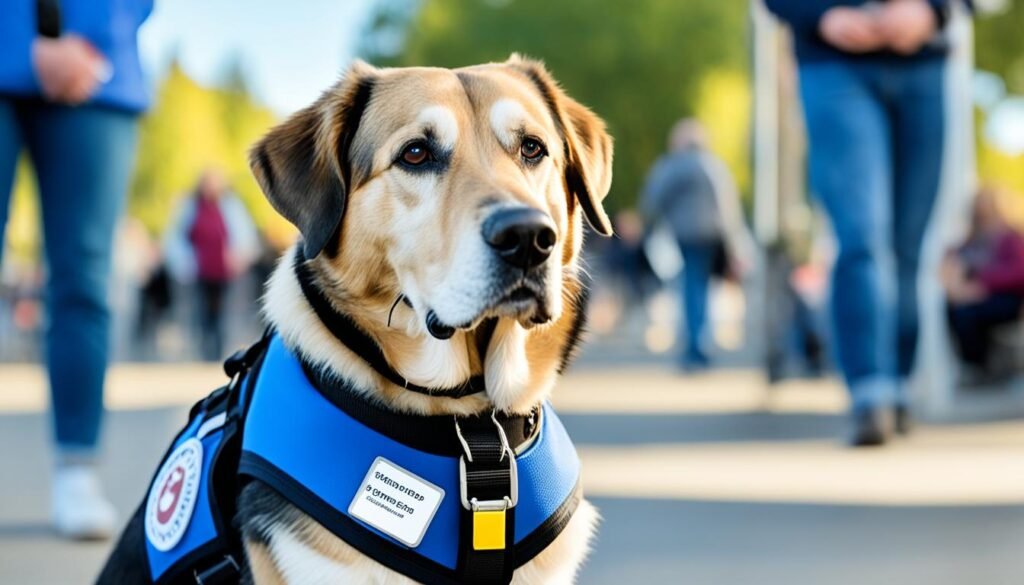
Service Dogs in Public Places
Service dogs have the right to accompany their handlers in all public places where the general public is allowed. This includes areas such as restaurants, hotels, schools, and public transportation. Service dog access rights ensure that individuals with disabilities can navigate these spaces with ease and equality.
Under the legal requirements for service dogs, establishments that sell or prepare food are generally required to allow service animals in public areas, even if there are state or local health codes that prohibit animals. This means that service dogs must be allowed access to public areas of restaurants, regardless of health code restrictions. It is important to remember, however, that service dogs are not allowed on tables or chairs and must remain on the floor or on the handler’s lap.
| Public Places | Service Dog Access Rights |
|---|---|
| Restaurants | Service dogs are allowed in public areas but not on tables or chairs |
| Hotels | Service dogs have the right to stay with their handlers in hotel rooms |
| Schools | Service dogs are permitted in schools to assist students with disabilities |
| Public Transportation | Service dogs can accompany their handlers on buses, trains, and airplanes |
It is important to emphasize that service dog handlers cannot be isolated from other patrons, charged fees that are not imposed on individuals without service animals, or treated less favorably due to their service dog. These legal requirements for service dogs are in place to ensure fair and equal treatment for individuals with disabilities and their service animals.
Service Dogs in Food Facilities
When it comes to accessing food facilities, service dogs are allowed under the regulations set forth by the Americans with Disabilities Act (ADA). This means that individuals with disabilities who rely on service dogs can bring their four-legged companions with them into indoor dining rooms and other areas of food establishments.
Staff working in food facilities have the right to ask two limited questions regarding the service dog. They can inquire whether the dog is required because of a disability and what specific tasks or work the dog has been trained to perform. These questions help establish the legitimacy of the service dog without delving into interrogating the handler about their disability or requesting documentation.
For individuals who may have allergies or other sensitivities to dogs, food facilities are required to make reasonable accommodations. This can include assigning different seating locations within the establishment, ensuring that individuals with service dogs can enjoy their meals without compromising their health.
However, it is important to note that service dogs are not allowed in shopping carts or on tables and chairs within food facilities. They must remain under the control of their handlers and either be seated on the floor or on the handler’s lap.
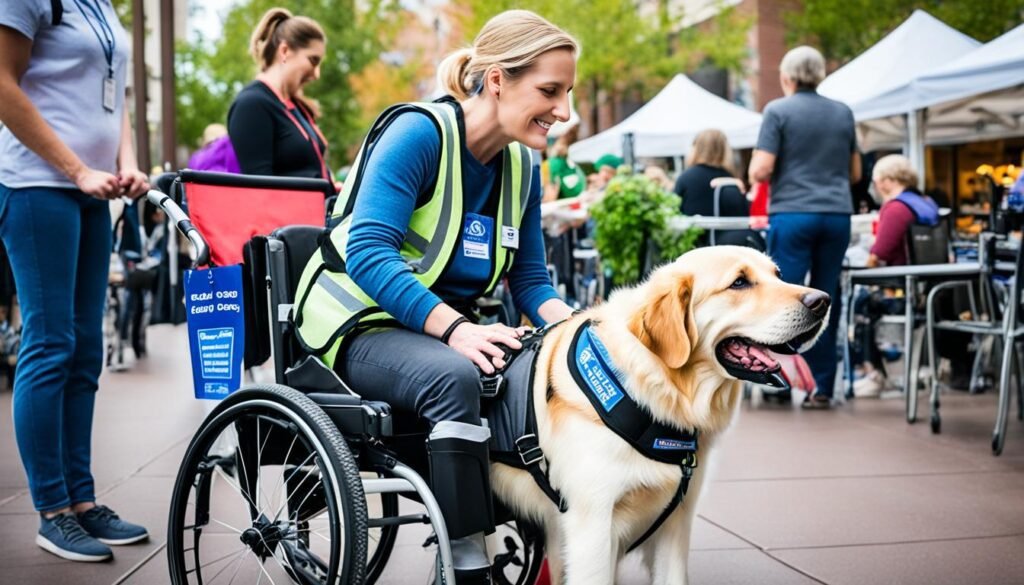
| Service Dog Guidelines in Food Facilities | Allowed | Not Allowed |
|---|---|---|
| Indoor Access | ✔️ | ❌ |
| Staff Questions | ✔️ (Limited) | ❌ (about disability or documentation) |
| Allergy Accommodations | ✔️ | ❌ |
| Shopping Carts | ❌ | ✔️ |
| Tables and Chairs | ❌ | ✔️ |
Navigate the world of food facilities confidently with your service dog, knowing that they are welcome in indoor dining rooms and that staff will respect your rights as a service dog handler. By following these guidelines and adhering to the ADA service animal regulations, both individuals with disabilities and food establishments can coexist harmoniously and inclusively.
Service Dogs vs. Pet Dogs in Food Facilities
The ADA distinguishes between service dogs and pet dogs when it comes to access rights in food facilities. Service dogs are defined as dogs that are individually trained to perform tasks or work for individuals with disabilities. They are allowed in all areas of food facilities where the public is permitted to go, including indoor dining rooms.
Pet dogs, on the other hand, are not allowed in indoor dining rooms and can only be on outdoor dining areas (patios) at the discretion of the restaurant owner. It is important to note that pet dogs in these areas are subject to additional regulations. They must be on a leash or confined in a carrier and should not have direct contact with food employees.
Service Dog Certification and Registration
Contrary to popular belief, the certification and registration of service dogs are not required under the Americans with Disabilities Act (ADA). The ADA does not recognize any official documentation or identification for service dogs. As such, businesses and entities are prohibited from asking for certification or registration, demanding specific training documentation, or requesting that the dog demonstrate its abilities. Instead, the focus is on the dog’s training and its ability to perform tasks or work for individuals with disabilities. Service dog handlers are not obliged to carry any form of identification for their service dogs.
| Certification and Registration | Not Required |
|---|---|
| Recognized Documentation | None |
| Business Inquiries | Prohibited |
| Training Documentation | Not Mandatory |
| Focus on | Training and Ability |
| Identification Requirement | Not Applicable |
Further Resources and Contact Information
For more information about ADA service dog guidelines and service animal regulations, you can visit the official ADA website at ADA.gov. The website provides comprehensive resources and guidance on service dog rules and regulations, ensuring that individuals with disabilities and businesses are well-informed.
If you require further assistance or have specific questions, the ADA Information Line is available to help. You can reach an ADA Specialist by phone at 800-514-0301 (Voice) or 1-833-610-1264 (TTY). The ADA Information Line is an invaluable resource for obtaining accurate information and gaining clarity on service animal-related inquiries.
Additionally, the ADA website offers a dedicated section with frequently asked questions about service animals and the ADA. This section provides additional clarity on common concerns and inquiries, further enhancing your understanding of service dog guidelines and service animal regulations.
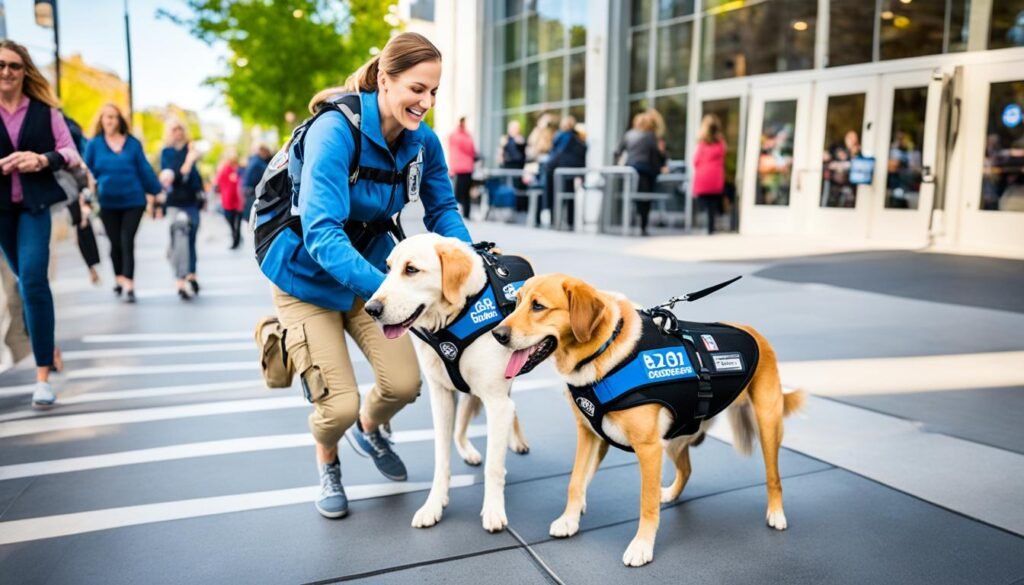
With these resources and contact information at your fingertips, you can navigate the realm of service dog rules and regulations effectively and confidently.
Conclusion
Understanding the rules and regulations surrounding service dogs is crucial for both individuals with disabilities and businesses. The Americans with Disabilities Act (ADA) has established clear guidelines for service dog access rights, etiquette, and definitions. It is essential to respect service dog handlers and their animals, providing them with the necessary access to public spaces and offering assistance when needed.
By adhering to the legal requirements and practicing proper service dog etiquette, individuals with disabilities can confidently navigate public spaces, ensuring equal access and inclusion in society. Businesses should be aware of the rights and responsibilities associated with service dogs, allowing them to provide a welcoming environment for all customers.
Remember, service dogs play a vital role in the lives of individuals with disabilities, providing essential support and assistance. Let’s create a society that values and respects service dogs, recognizing their importance in promoting independence and accessibility for all.
FAQ
What are the rules for service dogs?
Service dogs are governed by the Department of Justice’s regulations implementing the Americans with Disabilities Act (ADA). These rules apply to state and local government services as well as public accommodations.
How are service animals defined and who qualifies?
Service animals, as defined by the ADA, are dogs that are individually trained to perform tasks or work for people with disabilities. These tasks must be directly related to the person’s disability.
What are the access rights for service dogs?
Service dogs are allowed to accompany their handlers in all areas where the general public is allowed. This includes places like hospitals, restaurants, and stores.
What is the etiquette for interacting with service dogs?
It is important to respect the rights and needs of individuals with service dogs. Do not pet or distract a service dog while it is working, and refrain from asking personal questions about the handler’s disability.
Where are service dogs allowed in public places?
Service dogs have the right to accompany their handlers in all public places, including restaurants, hotels, schools, and public transportation.
Can service dogs be in food facilities?
Yes, service dogs are generally allowed in food facilities, including indoor dining rooms. Staff in food facilities can ask limited questions about the service dog’s purpose and training.
What is the difference between service dogs and pet dogs in food facilities?
Service dogs are individually trained to perform tasks for individuals with disabilities and are allowed in all areas of food facilities. Pet dogs can only be in outdoor dining areas at the discretion of the restaurant owner.
Is certification or registration required for service dogs?
No, the ADA does not require certification or registration of service dogs. Businesses cannot ask for specific documentation or require dogs to demonstrate their abilities.
Where can I find more information about service dog rules?
The ADA website (ADA.gov) provides comprehensive resources and guidance on service dog regulations. The ADA Information Line is also available for further assistance.
What are the legal requirements for service dogs?
Service dogs must be individually trained to perform tasks for individuals with disabilities. They have the right to access public places and must be under the control of their handlers.



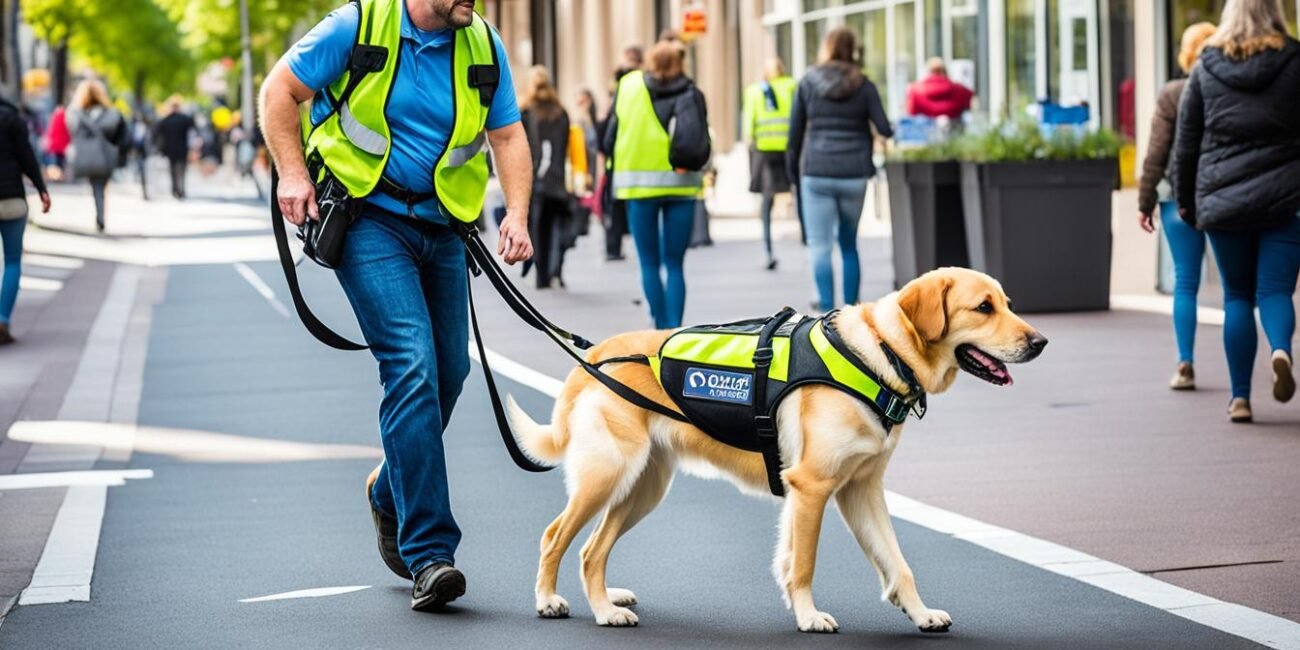

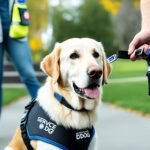
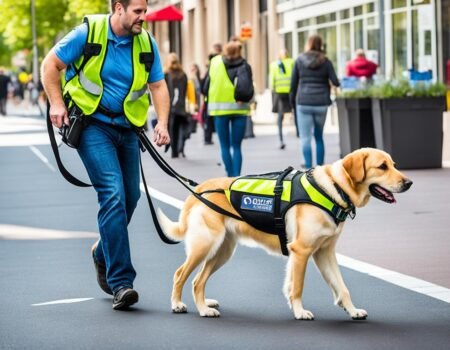
No Comment! Be the first one.